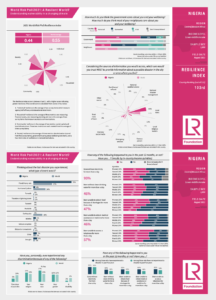Alarm bells have been raised as LESS THAN A THIRD of families in Central and Western African feel prepared to deal with disasters as threat of climate change continues to grow.
Central and Western African countries are among the lowest scoring when it comes to resilience in the face of disaster, according to a global safety charity’s new report – which also highlights concerns that most families may not be able to deal with increasingly frequent climate events such as flooding.
The findings come from the latest report from the Lloyd’s Register Foundation World Risk Poll, powered by Gallup: ‘A Resilient World? Understanding vulnerability in a changing climate‘. It presents data from over 125,000 people in 121 countries and reveals how people feel their communities and their country’s infrastructure and government can cope in the face of disasters.
With a 0.44 score, much lower than the world average of 0.55, Central and Western Africa is the lowest ranked global region on the World Risk Poll Resilience Index. Set between 0 and 1, it is calculated from scores in four areas – individual resilience, household resilience, community resilience and society resilience.
According to the data – collected in 2021 – only 29 percent of people in Central and Western Africa feel their families are prepared to deal with a disaster, the fifth lowest region in the world. Yet more than a quarter (26%) of people in the region said they had experienced a disaster in the past five years – with flooding being the most common cause, especially in Nigeria (where 75% of those who had experienced a disaster said this was the cause), Gabon (73%) and Ghana (73%) – roughly twice the world average, which sits at 37%.
The Poll also reveals a considerable lack of confidence in governments across Central and Western Africa – only one of two regions where the majority of respondents (56%) say their government does not care about them ‘at all’. In some countries, that figure rises to around two thirds: Senegal, for example, has the highest percentage of people feeling like their government does not care about them at all (67%), closely followed by Nigeria (64%) and Gabon (63%).
However, the data also shows how greatly people in Central and Western Africa have suffered in the face of disasters. The majority of the population, across all countries in the region, have reported shortages and difficulties accessing vital resources. In the past year before the Poll was conducted, at least three quarters of people have gone without electricity for more than a day in Nigeria (93%), Cameroon (86%), Gabon (84%) Togo (80%), Ghana (76%) Ivory Coast (76%) and Congo (75%). Similar issues accessing clean drinking water were also reported, with a majority of the population having found themselves unable to access it for more than a day in all countries except Mali (35%), Nigeria (46%) and Ghana (36%) – with Gabon topping the list (85%).
The data also reveals a lack of confidence in the region’s already limited infrastructure. Only around a third (35%) of respondents in Central and Western Africa feel their national government is well-prepared to deal with a disaster, a figure that drops to 27% when asked the same question about local government. Meanwhile, less than a third (31%) have faith in their hospitals’ ability to cope.
Nonetheless, there is a strong sense of community support across the region that may help people cope in a crisis, in the absence of government support. Central and Western African respondents to the Poll were among the most likely to help a stranger in need – seven in 10 (70%) said they had done so in the past month. The proportion of people who felt like their neighbours cared ‘a lot’ about them and their wellbeing also exceeded the world average (23%) in all countries in the region apart from Gabon (13%) and Congo (20%). This sentiment is especially strong in Mali, where 57% of respondents felt their neighbours cared a lot about them and their wellbeing, in Guinea (56%), and in Sierra Leone (51%).
Director of Evidence and Insight at Lloyd’s Register Foundation, Dr Sarah Cumbers, said: “The World Risk Poll is designed to provide insight for policymakers into which risks are most affecting the lives of populations across the world, and our findings will help them work with communities to improve resilience in the face of increasingly common and severe natural hazards such as flooding.”
According to Cumbers, “Many countries in Central and Western Africa struggle with widespread poverty, violence and instability. Combined with weaker infrastructure, these factors mean people in the region are particularly vulnerable to disasters – as illustrated by the region’s low Resilience Index score.”
She maintained that, “Our report highlights an underlying lack of faith in governments and institutions, driving people to rely on their neighbours and communities to support them in a crisis, especially in light of common resource shortages,” adding, ” With high experience of disasters in the region, particularly those caused by flooding and heavy rain, upgrading and investing in infrastructure to improve resilience needs to be a priority for those seeking to combat climate changes and its effects.”
The World Risk Poll
The Lloyd’s Register Foundation World Risk Poll is the first global study of worry about, and harm from, risks to people’s safety.
This is the second edition of the Poll, based on around 125,000 interviews conducted by Gallup in 121 countries during 2021. This is down from 142 countries in the 2019 Poll due to Covid-19 related restrictions (for the full list of countries included in the 2021 Poll, see Appendix 3 of the report). Where possible, interviews were conducted via telephone.
The data includes places where little or no official data on safety and risk exists, and so constitutes a unique resource for defining the nature and scale of safety challenges across the world, as reported first-hand by those who experience them.
This intelligence can and should be used by governments, regulators, businesses, NGOs and international bodies to inform and target policies and interventions that make people safer, working in partnership with and empowering communities.
The Resilience Index
The World Risk Poll Resilience Index provides a summary score between 0 and 1 – based on a number of individual, household, community and society level factors asked about within the Poll – of how prepared different countries and demographics are to deal with shocks. It also shows how resilient countries are within each of the four resilience domains (individual, house, community and society). The Index can be explored in detail using an interactive data visualisation on the World Risk Poll website from 14 September.
Lloyd’s Register Foundation
Lloyd’s Register Foundation is an independent global safety charity that supports research, innovation, and education to make the world a safer place. Its mission is to use the best evidence and insight, such as the World Risk Poll, to help the global community focus on tackling the world’s most pressing safety and risk challenges.
 ..:: AUTO REPORT AFRICA ::..
..:: AUTO REPORT AFRICA ::..





